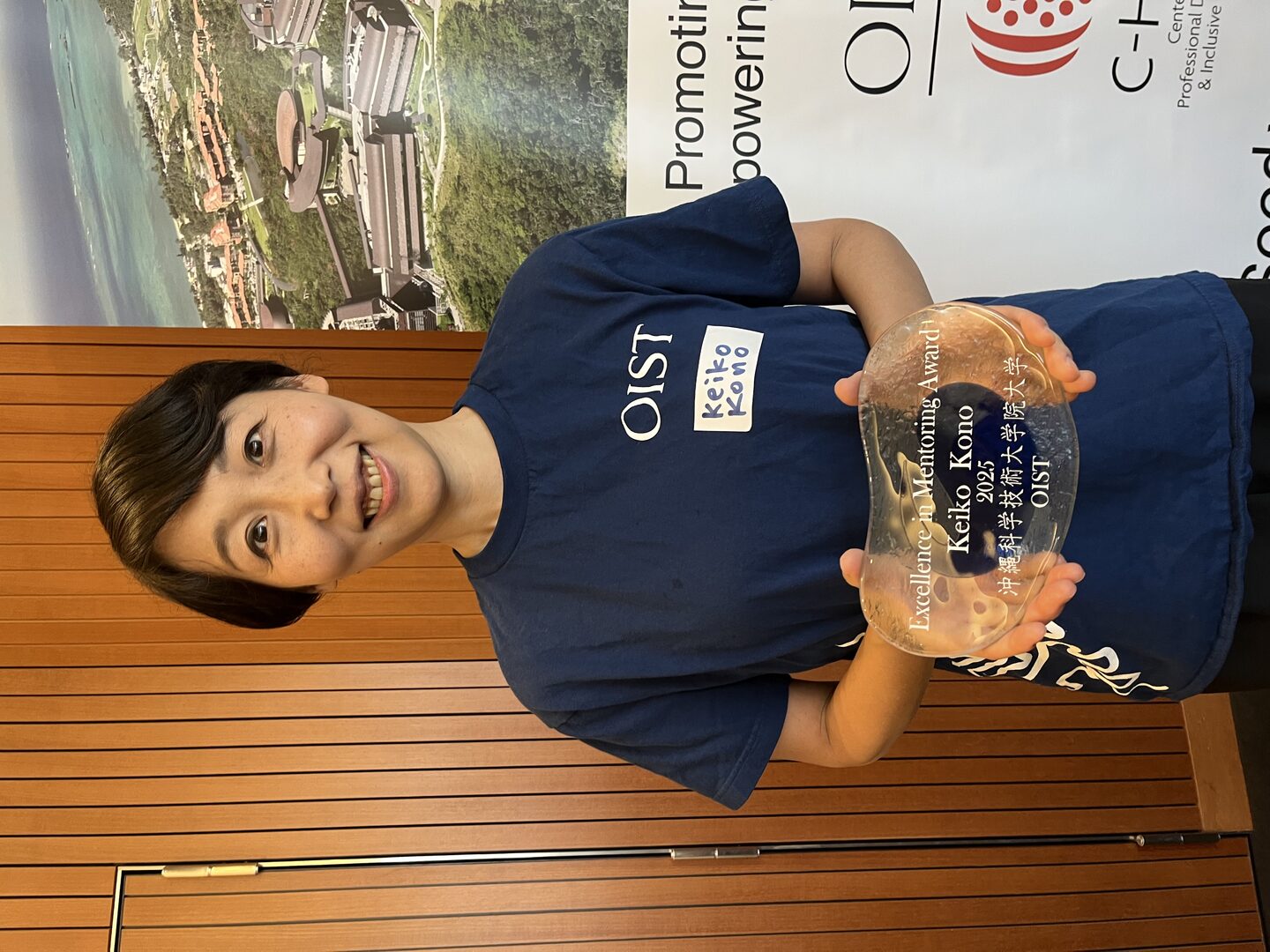Faculty Excellence in Mentoring Award
About the award
The Excellence in Mentoring Award recognizes the paramount role that inclusive mentoring plays in the professional development and career advancement of OIST students, postdoctoral scholars, and research staff, and the lifelong impact of excellent mentors. The award honors Faculty members’ demonstrable commitment to engender effective mentoring relationships and their ongoing efforts to cultivate productive, inclusive research environments.
Present and Past Award Recipients
2025- Dr. Keiko Kono
2024- Dr. Franz Meitinger
2023- Dr. Filip Husnik; honorable mention: Dr. Christine Luscombe
2022- Dr. Paola Laurino; honorable mention: Dr. Tadashi Yamamoto and Dr. Gail Tripp
2021- Dr. Kazumasa Tanaka
2020 - Dr. Amy Shen
2019 - Dr. Marylka Yoe Uusisaari & Dr. Thomas Busch
2025 Faculty Excellence in Mentoring Award Citation

Professor Keiko Kono, who leads the Membranology Unit, was awarded OIST’s 2025 Faculty Excellence in Mentoring Award.
The award was presented Friday, April 11, 2025, at an awards ceremony during the Faculty Retreat. Interim Dean of Faculty Affairs Kathy Takayama presented the custom-designed Okinawa glass plaque and delivered the official citation to Professor Kono at the ceremony.
Here is the citation in full:
The welcoming and supportive research environment you have created in your lab has benefited not only your own students and researchers, but those from other units as well. Indeed, a student from another unit has noted that the inclusive and respectful climate you have fostered has had a tremendous impact on their career and personal well-being. All students who have been fortunate to enter your realm of mentorship, regardless of location, feel valued and empowered to succeed. Time and again, they highlight your ability to bring out their full potential by unequivocally validating the importance of work-life balance and personal well-being in fostering a fulfilling career.
Students have highlighted how your constructive critiques and clear guidance have been instrumental in building their confidence, and how your proactive advocacy has enhanced their visibility in the broader scientific community. Your inclusive leadership has promoted the ability of all of your unit members to collaborate effectively and achieve their best work.
Nomination Process and Criteria for the Award
Nominations may be initiated by students, researchers (postdoc, research fellows, staff scientists), and research unit technicians only.
Only one nomination per person is allowed. However, multiple nominations from the same unit are highly encouraged as the number of nominations per nominee will be considered during the evaluation process.
Previous award recipients are not eligible for the following two years.
The nominator must complete an on-line nomination form with a required narrative statement that articulates the faculty member’s significant contributions to creating an effective, inclusive, and enriching research environment, and their impact on unit members’ personal/career development and professional advancement.
While dedicated, highly effective faculty often demonstrate effective and inclusive teaching practices, the nomination should focus on the faculty member’s contributions to mentoring but not on teaching relationships between a faculty member and students, trainees, researchers, and administrators. This award is distinct from the Excellence in Teaching Award annually conducted by the Graduate School.
The outcomes of C-Hub’s Inclusive Mentoring Mini-Symposium, together with research on mentoring have consistently revealed the following key attributes that are demonstrable of effective, inclusive mentors:
1. Inclusive, empathetic leadership and ongoing cultivation of a respectful, healthy, and collaborative research climate for all members.
Effective mentors engage in intellectual, empathetic leadership to support and foster inclusive, equitable, and productive research environments that allow all individuals to develop and succeed. They model best practices and treat every individual respectfully, sharing experiences – including successes and failures – to enable mentees to recognize the multiple pathways in career development.
2. Empowerment of mentees through ongoing feedback and clear communication
Mentoring relationships are strengthened through effective ongoing guidance and constructive feedback. Effective mentors are active listeners, and provide and facilitate clear and transparent communication. Expectations, roles, and practices are clearly articulated for all members of the research team, and mentors also model their own commitment to meeting expectations as well.
3. Commitment and valuing of personal and professional growth
Inclusive mentorship enables all members to develop a sense of belonging and gain ownership over their career trajectory. A mentor’s interest in, and commitment to the mentee’s personal and professional growth and their career interests builds confidence and agency, engenders motivation, and supports the mentee’s lifelong skill development.
4. Proactive advocacy and enhancement of mentee support networks
Effective mentors recognize the constellation of support networks that provide the diverse needs of mentees at various stages of their career. They are strong advocates for their mentees, connecting them to a variety of key individuals, opportunities, and/or resources that can contribute to the mentee’s professional or personal support networks. Supporting mentees to build their networks fosters independence, while enhancing their agency to seek opportunities and benefit from their expanding mentorship community.
Nominations will be reviewed based on the four criteria described above.
Award selection committee:
- 2 previous faculty award recipients
- 2 representatives of the OIST Researcher Community
- 2 student representatives



